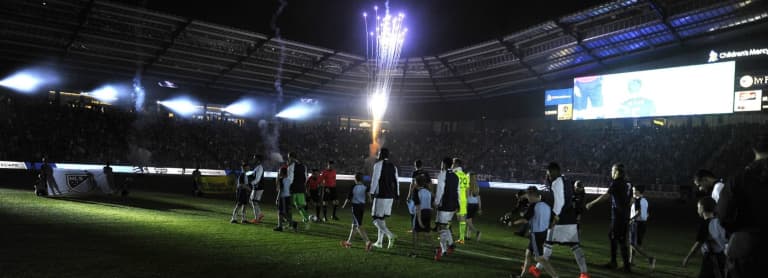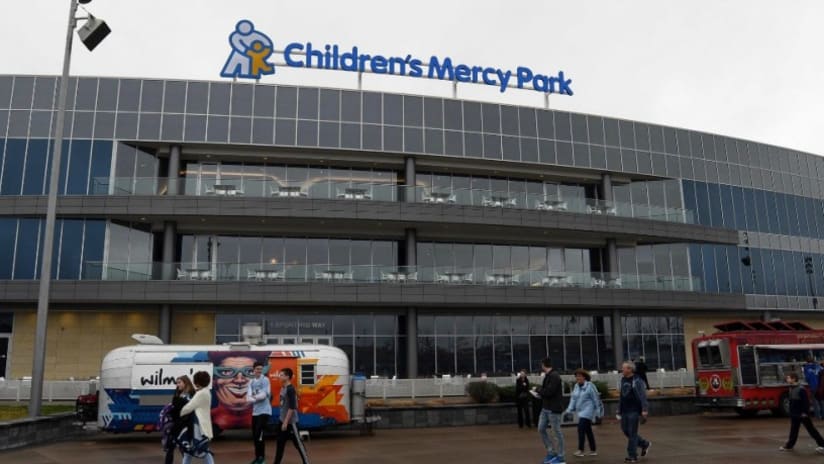KANSAS CITY, Kan. – The place was packed to the concourses – an opening-day record of 20,178 for a stadium that seats 18,457. With pyrotechnics, swirling spotlights and Kansas City band The Architects rocking out in the southeast tunnel entrance, it was as though people had gathered for a soccer match and a concert broke out.
Rapper Tech N9ne, raised just 25 miles away in Kansas City, Mo., took the microphone and led the crowd in the call-and-response chant “I Believe That We Will Win.” There were anthems, salutes to the military – and then Sporting Kansas City took the field and gave fans even more to celebrate, beating the Vancouver Whitecaps 2-1 in Sporting's 2016 home opener.
The stadium's new logo, with its stylized image of an attentive adult helping a child to walk, was seemingly everywhere last Saturday night – plastered on the facades, the sideboards running along the pitch, the wall adjacent to the security check-in and just about everywhere in between.
Three hundred new signs, Sporting president Jake Reid estimated, and a 10-year commitment to the club's new partner, Children's Mercy Hospital.
The transition from Sporting Park to Children's Mercy Park was complete, it seemed.

In one way, it was and is. But in another – and the way that counts most, and will keep counting for years to come – it's just getting started. And as it continues to develop, this partnership has the potential to benefit kids, and the doctors who treat them, around the world.
That potential impact gives the deal a legitimate claim as the most innovative, socially responsible naming-rights deal in American professional sports.
“I certainly don't think there's one that's even close to it,” Reid said. “There's so many moving parts to it, in a good way.”
Of course, Sporting are getting plenty out of the deal, as well, in the form of specialized medical attention for their academy players. Children’s Mercy, meanwhile, gets both exposure and an opportunity to get better at what it does in terms of practicing and advancing pediatric sports medicine.
One big piece of the puzzle is taking shape just across Interstate 435 from Children’s Mercy Park, where construction crews are at work on the pending National Training and Coaching Development Center that, under the terms of the naming-rights agreement announced last fall, will house a 25,000-square-foot facility devoted to pediatric sports medicine.
The way hospital and club officials see it, the project will be an ongoing process with ever-spreading ripples as more and more aspects of the partnership fall into place.
Those ripples start with Sporting’s academy.
“We've talked about this in the past, how we have that sort of pyramid that starts with the youth, goes through our academy to now our USL team to our senior team,” manager and technical director Peter Vermes told reporters after last November's announcement. “It is truly about having the opportunity of creating that health and wellness all the way up through those ranks and leading all the way up to being an adult. There's no better place to start it than our youth.”
The basic provisions of the agreement include a full soccer-specific curriculum, covering everything from training techniques to nutrition, injury rehabilitation and prevention, for the Sporting Club Network of youth teams. Also included: conditioning, training and rehabilitation programs for Sporting's academy teams at the Swope Soccer Village training facility.
The Sporting Club Network covers about 200,000 people – players, parents, coaching staff and administration – but “our youth” doesn't just mean youngsters in Sporting's extensive and growing academy system.
The agreement also includes development of an anti-childhood obesity program, Sporting Moves, which emphasizes physical activity for all elementary-age children, not just soccer players. And it builds on and strengthens the Victory Project, which works – with public and private involvement from the club's players and staff – to provide needed support and services for pediatric patients, especially those with cancer.
“The focus is youth health and wellness for kids, and that's a key part of the mission of Children's Mercy, and Sporting is such a strong family-centered organization that that is a perfect fit with us,” Children's Mercy Kansas City president and CEO Randall O'Donnell said in November. “We have a very large sports medicine program for youth as part of our organization, and us coming together in this effort takes that out even more broadly into the region, gets more folks involved.”
All well and good, but why should that matter to people outside the region?
One word: Education.
Children's Mercy is a teaching hospital, not just a treating hospital, through its affiliations with the University of Missouri-Kansas City School of Medicine and the University of Kansas Medical Center. That means that once everything falls into place, physicians and medical students from all over the world will be able to use Sporting's youth system and the National Training Center to learn how to treat and prevent pediatric sports injuries.
“We have residents – orthopedic surgery residents, pediatric residents – around in our clinics every day,” said pediatric orthopedic surgeon Dr. Kevin Latz, director of Children's Mercy Center for Sports Medicine. “I think exposing them to the volume of athletes and the caliber of athlete that will now be in our facility, within our walls, will be invaluable.”
It won't be just young soccer players, both male and female, who benefit.
“It's not just soccer, but it's in all other sports,” Vermes said. “They're going to be able to use the information, the data that they're going to be able to look at with our teams, and be able to transcend that regionally, nationally, internationally, because of the kind of notoriety that this new training facility's going to get. So many people from around the world are going to come here to see what we are doing. I think that is an incredible asset that nobody's even valuing at the moment.”
It will take years for everything to develop, obviously, but this partnership stands to do considerable good, in a way that conventional naming rights deals simply can't. It goes beyond brand and image. It goes beyond the zeros on a check.
“It's not just a bunch of signs on a building …” Reid said. “But the true integration into the academy, what they're doing with our trainers, getting integrated with the National Training Center – there are things we're doing within the community that will really make a difference.”



